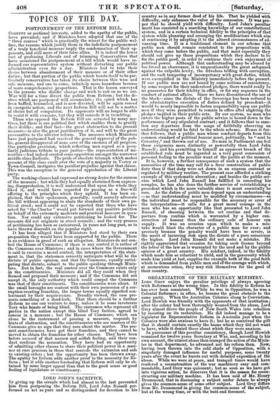TOPICS OF THE DAY.
POSTPONEMENT OF THE REFORM BILL.
Conarrn or sectional interests, added to the apathy of the public, have prevailed; and if Ministers have adopted that one of the "three courses" which is practically the wisest for the public wel- fare, the reasons which justify them in the indefinite postponement of a truly beneficial measure imply the condemnation of their op- ponents, and still more of their false allies. It is indeed the lower sort of professing Liberals and of trimming Conservatives that have occasioned the postponement of a bill which would have re- formed our representative system without disturbing our public administration even for a day. Ministers bad to take their choice between abandonment of their measure or of their other duties ; but that portion of the public which boasts itself to be par- ticularly conservative has taken its choice between this wise and safe measure, and one to come, infinitely more hazardous because of more comprehensive proportions. That is the lesson conveyed to the persons who dislike change and wish to rub on as we are. War will for a time divert the public from Reform ; but the de- sires which are postponed will accumulate; the spirit which has been baffled, benumbed, and is now diverted, will be again roused in energetic action, and the next Reform Bill will not be a matter of choice but of compulsion. Its opponents will no longer be able to resist it with evasions, but they will concede it in trembling. Those who opposed the Reform Bill are actuated by many mo- tives, but there is one political fact which enables them to gratify their dislike ; and that fact—the great obstruction to the present measure—is also the great justification of it, and will be the great provocative to the ulterior reform. The measure which Ministers have just postponed had received the general approval of the pub- lic, general disapproval of none save of the enemies of all progress. One particular provision, which reflecting men regard as a pecu- liarly judicious tribute to pure justice—the representation of mi- norities—had indeed created some opposition amongst the narrower middle-class Radicals. The pride of absolute triumph which makes persons of this class exult over the vote of a majority in Vestry or Tewn-Council, instigates the peculiar prejudice against that clause. This was the exception to the general approbation of the Liberal party. The working-classes had expressed no strong desire for the success of the measure ; but while they had equally abstained from express- ing disapprobation; it is well understood that upon the whole they liked it, and would have regarded its passing as a free-will offering to the principles which they uphold. It has been ex- plained, that their spokesmen, generally, could scarcely advocate the bill without appearing to abate the standards of their own po- litical creed; and it could not be expected that those who have asked for "the Charter" would put forward any positive petition on behalf of the extremely moderate and practical measure in ques- tion. Nor could any extensive petitioning be looked for. The measure did not originate in street councils ; and the very process of petitioning has been so caricatured, in years not long past, as to have thrown discredit on the popular right. It has been alleged that if Ministers had stood by their own proposition they would have been supported by the public. There is no evidence in proof of such an allegation. Ministers do not con- trol the House of Commons ; if there is any control it is rather of the Commons over Ministers ; and in cases where the Government is said to exercise a moral control, the interpretation of the state- ment is, that the statesmen correctly anticipate what will be the dictate of public opinion, and that the Commons, equally antici- pating that dictate, submit to the public speaking through Minis- ters. But in fact, the real control over the Commons exists only
• in the constituencies. Ministers did all they could when they framed and proposed their measure ; and if the Commons did not accept it, the only authority which could compel the Commons was that of their constituents. The .constituencies were silent. If the small boroughs are content with their own possession of a cor- ruption-creating franchise, the larger towns equally signified con- tentment by their acquiescence. Broadly viewed, the case pre- sents something of a dead-lock. That there should be a further Reform no one can venture to deny, unless it be some inveterate Tory who boasts of being blind. The statesmen who represent all parties in the nation except this blind Tory faction, agreed to, concur in a measure ; but the House of Commons, which can alone be the instrument of passing a measure, responds by hints of obstruction, and the constituencies who are masters of the Commons give no sign that they care about the matter. The pre- sent constituencies have got their franchise, and they cannot be moved to obtain the franchise for other classes. They have been 'before accused of that narrow and selfish feeling, and their con- duct confirms the accusation. They have had an opportunity of admitting other classes to share their political power in a man- ner at once gracious in those that concede the extension and safe to existing orders ; but the opportunity has been thrown away. The apathy for Reform adds another proof to the necessity for Re- form ; but it adds another foreboding that Reform will only be ob- tained by some larger appeal than that to the good sense or good feeling of legislature or constituency.


























 Previous page
Previous page